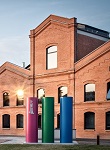Hydrogen for civil use: Hera Group, MASE and CIG launch pilot project
Hera Custom Facet Publish Date
Category Facet
Custom Facet
Search Bar
Asset Publisher
Hydrogen for civil use: Hera Group, MASE and CIG launch pilot project
The Ministry of the Environment and Energy Security, the Italian Gas Committee and Hera’s subsidiary Inrete Distribuzione Energia have signed an operating protocol to test the introduction of a mixture of natural gas and up to 10% hydrogen into household networks. The project involves a residential area in the province of Modena, and internationally recognized bodies have been tasked with supervising safety aspects.
The Ministry for the Environment and Energy Security (MASE), the Italian Gas Committee (CIG) and Inrete Distribuzione Energia (a company part of the Hera Group) have signed a protocol to carry out studies and field tests on mixtures of natural gas and hydrogen to be injected into distribution networks.
This is the first project to fall under the framework agreement signed by MASE and CIG aimed at creating favourable conditions for developing trials with mixtures of hydrogen and natural gas, to gradually introduce increasing percentages of low-carbon gas into gas networks. The “pilot” operating protocol, for the first time in Italy, calls for mixtures containing up to 10% hydrogen to be gradually used to supply an isolated segment of the network. While complying with the most demanding safety requirements, this is aimed at testing solutions that use green gasses in the civil and residential sectors as well. These energy vectors with a low environmental impact, in fact, could contribute to the decarbonisation of local areas with significant environmental benefits, making it possible to make the most of Italy’s existing gas infrastructure, which is unique in Europe in terms of extensiveness, without modifying the current heating systems. The first step of the trial involves feeding a mixture with 5% hydrogen into the network, which will contribute to ongoing studies before increasing the percentage, helping meet the country’s need to diversify its energy sources.
In line with its agreement with MASE and CIG, Inrete will therefore start testing in the upcoming months, cooperating with numerous partners and being supervised by internationally recognised bodies. The tests will involve operators from the entire gas supply chain, from transport to manufacturers of technological equipment, up to manufacturers of boilers and gas burners. The partial replacement of natural gas with hydrogen - whose combustion does not produce carbon dioxide (CO2), mainly responsible for global warming - is indeed a solution pursued by the Ministry of the Environment and Energy Security, in collaboration with specialists in the field and with the aim of facilitating the energy transition.
Trials within a project that started in 2022 in Castelfranco Emilia (Modena)
As of 2022, Inrete is at the head of an initiative that has already successfully tested, with temporary two-step trials, the introduction of a mixture of natural gas and 2% hydrogen into municipal gas networks. The study involved around forty families living in a residential area of Castelfranco Emilia (Modena), all of whom were adequately informed.
Having acquired the necessary know-how, in terms of both technology and safety, the Hera Group company, thanks to the protocol signed with the MASE and the CIG, and in agreement with the same residential area’s municipal administration, will launch the third phase of experimentation. It will thus be possible to explore the different operational aspects that enable the infrastructure to receive, in its current configuration, mixtures of natural gas and 5% hydrogen. This time, too, cooperation coming from citizens will be crucial, at no cost to the families residing in the area chosen for the tests. Indeed, the latter will also be carried out downstream of the meter, with checks on the operations of domestic gas appliances in households, including boilers and burners, to obtain a precise evaluation of the results.
“The pilot agreement we have just signed with the Ministry of the Environment and Energy Security and the Italian Gas Committee,” comments Hera Group CEO Orazio Iacono, “comes as important recognition of our ability to innovate in enabling infrastructures to support transitions, first and foremost the energy transition. The need to diversify our country’s energy sources, which is now urgent, cannot disregard the use of green gases such as hydrogen, and in this context our assets are ready to increase the percentage of the blend in networks, as foreseen by the protocol, reaching 10% and confirming their alignment with the European taxonomy. These trials represent an additional driver for developing strategic and innovative activities aimed at reducing the carbon footprint, by accompanying customers in the energy transition and ensuring the resilience of the areas served.”
“We are proud to have signed this operational protocol with MASE and CIG for tests involving green gas,” adds Federico Bronzini, CEO of Inrete Distribuzione Energia. “We have thus confirmed our commitment to pursuing advanced solutions aimed at reducing energy dependence on traditional fossil fuels. Thanks to significant investments and our experience in the sector, we are ready to concretely promote, once again, the path towards decarbonisation in the civil and residential sector as well.”
NexMeter, the advanced meter developed by the Hera Group
For a correct gas measurement, this trial calls for the use of NexMeters by all users in Castelfranco Emilia involved in the project. NexMeter is the G4 gas meter developed by the Hera Group, already able to measure mixtures of methane and hydrogen; this device, which has opened up new possibilities in the sector thanks to both the advanced technologies it uses and its safety functions, is already found in almost 300,000 Italian homes connected to the gas distribution networks managed by the Hera Group’s distribution companies.
The project’s collaborators:
BAXI; Bosch; Electrolux; Emerson; Ferroli, Immergas; Innovhub SSI; Pietro Fiorentini; RINA; Snam; TdZ, Valpres, a Bonomi Group company, Alfa Engineering and Idrotherm 2000.


.jpg/a418ee11-30c3-c1f9-fb4f-28798f88f103)
.jpg/06437ce4-bf74-f276-9831-f0bc8f20430a)

.jpg/655e453a-41aa-f3b9-6e0a-9c054d7b4006)